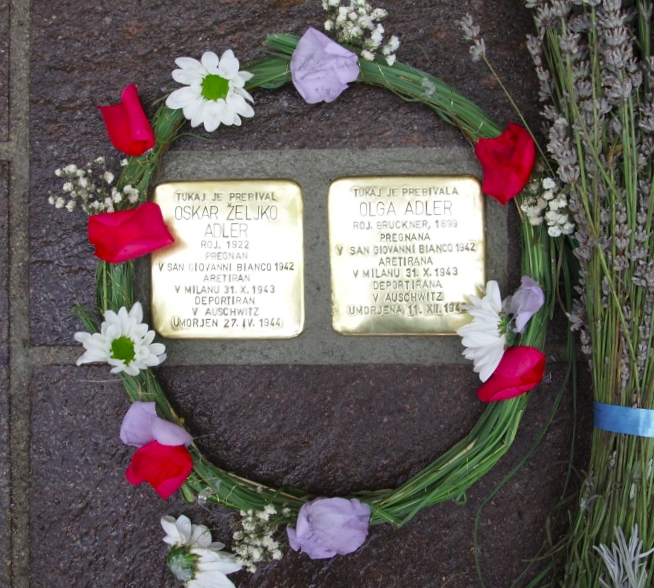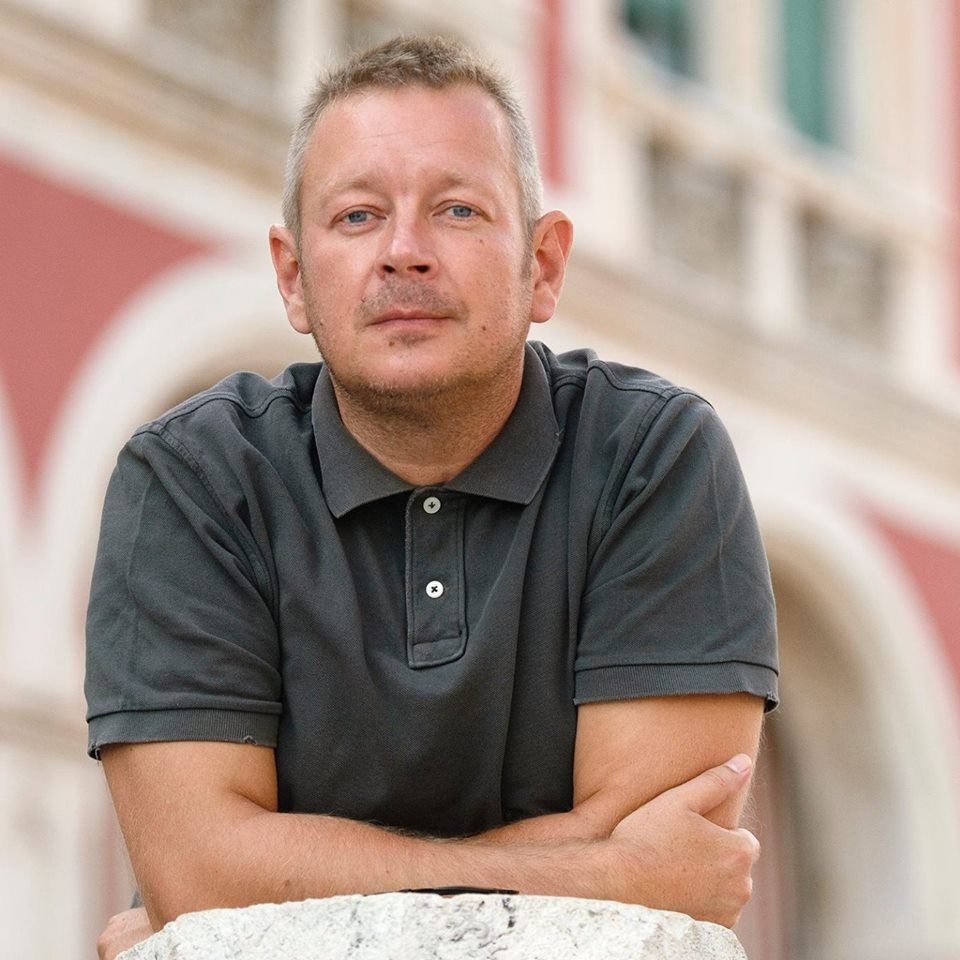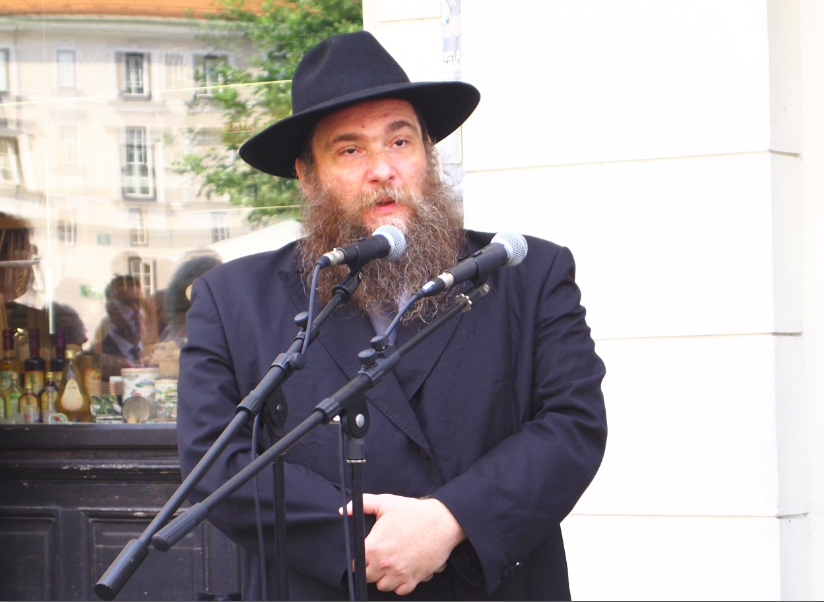Ljubljana related
The Canadian Jewish News has just published an article by Michael Fraiman looking at an often neglected story, but one that’s been gaining more attention in recent years, the history and present of Jews in Slovenia.
While Ljubljana has a historic Jewish Quarter in the Old Town (as marked by Židovska ulica (Jewish Street) and Židovska steza (Jewish Path)) – and the site of the Jewish Cultural Centre – it hasn’t has a large Jewish community for many years. Indeed, Jews were officially banned from the city in 1515, a restriction that stayed in place until 1867, with lingering anti-Semitism deterring new arrivals.
In the years before World War II there were thus less only around 1,500 people who self-identified as Jewish in the whole of Slovenia, and this community was then essentially destroyed with the murders that took place as part of the Holocaust.

Two of the Stolpersteine. Photo: JL Flanner
It was only last year, 2018, that the Jewish community was symbolically welcomed back to Slovenia by President Borut Pahor as part of the events marking the laying of the first Stolerpsteine, a story you can read about here (along with a map of the stones’ locations). Two men who played key roles in that event were Robert Waltl and Rabbi Ariel Haddad, who are the subjects of The Canadian Jewish News story.

Robert Waltl. Photo: Mr Waltl's Facebook page
Mr Waltl is a familiar face to many, being a performer and theatre director, active in the cultural life of the city in the context of his Mini teater (sic), as well as putting in appearances as Dedek Mraz (Grandpa Frost) around the end of the year. But Waltl is also the man who runs the Jewish Cultural Centre (at Križevniška 3 SI-1000 Ljubljana – see the map at the end of this story). It’s here that you’ll find artworks and exhibits related to Jewish history in the country, including ones that mark the 587 Slovene Jews who died in the Holocaust.
Rabbi Ariel Haddad at the laying of the first Stolpersteine in Ljubljana. Photo: JL Flanner
The same building also houses the only working synagogue in Slovenia, and it’s here that Rabbi Ariel Haddad enters the picture. The Rome-born Rabbi lives in Trieste, about an hour from Ljubljana, but often visits the city in his capacity as Chief Rabbi of Slovenia. Rabbi Haddad’s connection with the Slovene capital started in 2000. He visited the city ahead of Passover and, since the local community lacked a Rabbi, he was invited to hold what was perhaps first seder of Pesach in Slovenia since the war.
A visit to the Jewish Cultural Centre
It’s an interesting story of a community returning to life after unimaginable pressures and suffering, and now slowly reclaiming its place at the heart of a city that has hopefully left behind the horrors of anti-Semitism, and is blossoming into a more tolerant and open society, and you can read more of it at The Canadian Jewish News.
You can learn more about the Jewish Cultural Centre and synagogue, in English, here, visit it at the location shown below, or follow its work on Facebook. The schedule for the nearby Mini Teater, with performances in all genres and for all ages, can be found here.
STA, 26 November 2018 - Education Minister Jernej Pikalo discussed how to prevent anti-Semitism at Monday's session of the EU's Education, Youth, Culture and Sport Council in Brussels, pointing to the thin line between freedom of speech and hate speech and noting that the educational system played the key role in preventing the spreading of hatred.
Pikalo said that all European societies had the problem of defining the line between freedom of speech and hate speech, which was why all kinds of deviations were taking place.
Related: Our stories on hate speech can be found here
The minister stressed that more proactivity in the prevention of spreading of hatred towards any individuals or groups would be introduced in the educational system.
"Policies and approaches in this field must be especially sensitive and proactive, because we must not allow any of the historical situations we were in to repeat," Pikalo stressed.
He said that the Holocaust must not be only a history lesson, but a lesson for the present time, adding that Slovenia was playing an active role in that respect.
Slovenia sends teachers to Israel each year
Pikalo noted that around 50 teachers from Slovenia went to Israel every year as part of an educational programme, adding that Slovenia also had curricular and extracurricular activities which promoted democratic awareness.
In the context of hate speech, the minister also commented for the press on the call by Prime Minister Marjan Šarec to state-owned companies to reconsider pulling ads in the media which instigate hate speech.
Related: Our stories on Jewish Slovenia are here
Pikalo said that he supported Šarec's call. "It does not matter at the moment what direction the matter will take," he said, noting that the prime minister was not calling on the companies to act, but to consider an idea.
The EU ministers also discussed youth-related topics, focusing on the question of how to best implement the new European strategy for youth.
Slovenia wants greater integration of EU education
Pikalo said that from now on, the sessions of the government council for youth will feature relevant ministers, who would get better acquainted with the problems and challenges faced by the youth sector in Slovenia.
The ministers further discussed the Towards a European Education Area by 2025 document, a new initiative recently unveiled by the European Commission, which includes the idea to establish a network of European universities.
As a country which wants to be at the core of the EU, Slovenia wants to be connected in the field of education, said Pikalo, while noting that educational policies were always national policies.
The minister said that he had received initiatives from two Slovenian universities for cooperation at the EU level, adding that his ministry supported such integration.
STA, 1 September 2018 - Slovenia will join the European Days of Jewish Culture 2018 on Saturday as theatre actor Robert Waltl tells Jewish tales to visitors of Maribor Park.
STA, 23 August 2018 - The European Day of Remembrance for Victims of Totalitarian Regimes will be marked in Slovenia with various events today, including by President Borut Pahor's visiting the largest Jewish cemetery in the country.
The city turns a new page on a day to reject hate while never forgetting the past.
STA, 30 July 2018 - Interactive net artist Vuk Ćosić has launched a project with the poster company TAM-TAM featuring poster portraits of Jewish residents of Ljubljana who were taken to Nazi concentration camps during the Holocaust, which announces the installation of Stolpersteine in the Slovenian capital next week.
STA, 21 April 2018 – As Israel was founded 70 years ago, on 14 May 1948, some 200 Slovenian Jews are estimated to have moved there from Slovenia, although the Jewish Community in the country does not have exact data.
Several Jewish cultural exhibitions also planned.






